#Love of Siam
Explore tagged Tumblr posts
Text


Chookiat Sakveerakul - Love of Siam (2007)
58 notes
·
View notes
Note
BL recs (from any country) that don't have any s*x scenes? I'm too ace to enjoy them at all. Happy ending preferred, angst v welcome:)
BLs Without Sex Scenes
Oof, this is a hard one. Is a dead fish kiss okay? I do have a heat sorting on the spreadsheet of doom, and there are some with no kissing at all, but a dead fish kiss is in most of the HEA ones.
BLs with No Kisses
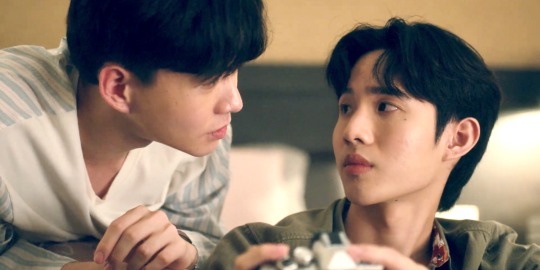
21 Days Theory (Thailand, YouTube) - the only thing I didn't like about this pulp was the fact that they don't kiss, so... yeah, this is my first pick for you. Very YA first love angsty, fantastic queer rep and side characters. RECOMMENDED
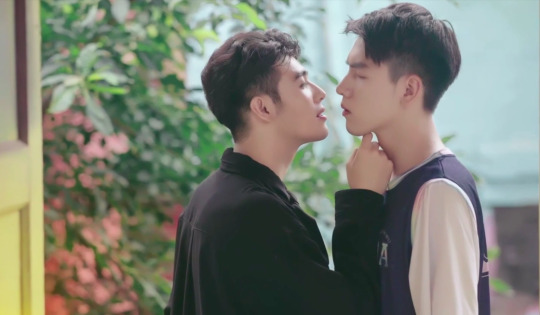
My Esports Genius Brother (China, Gaga?) - it's hella odd censored bromance but enjoyable. No real angst tho.

HIStory My Hero (Taiwan, Viki) - basically a BL with no sex or kissing, but also body-swap so is it BL? I can't remember the end but I think it's happy?

Silhouette of Your Voice AKA Hidamari ga Kikoeru (Japan, ????) - this 2017 yaoi adaptation is a full on BL just no kissing at all. The source manga (I Hear the Sunspot) is a favorite of mine and the casting was decent. HIGHLY RECOMMENDED for you (but not in general). Grey only.

Love of Siam (Thailand, ????) ALL THE ANGST, I'm pretty sure the most they do is hug, I could be v wrong though because too sad for me to ever rewatch. Very formative to the Thai BL industry.
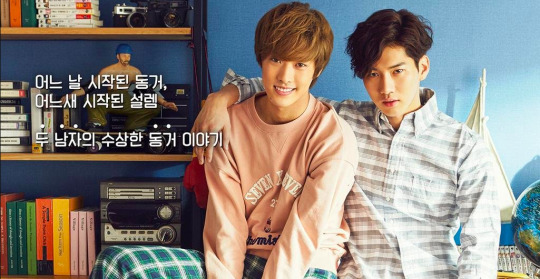
The Lover (BL cut) (Korea ????) sometimes you can find the BL cut on YT, it has slapstick comedic sexualized moments that are maybe a little homophobic (or something), no actual sex or kissing, but no angst at all. (Korea's working some shizz out with this early offering.)
Kabe Koji AKA Kabesaa Doujin Sakka no Neko Yashiki-kun wa Shounin Yokkyuu wo Kojirasete iru (Japan, Viki) - I watched this and I was excited about it before it aired, but I seem to have expunged it from my memory and kept no screen caps in annoyance, so that's all I got.

Love in Spring AKA Spring of Crush (Korea, ????) - a crossdressing historical that flew utterly under the radar. I decided it just wasn't really BL, but it has BL aspects and it's kinda a little queer... or something. Grey only.
Evening Cafe (Thai pulp, YouTube) - No heat and no kisses, but a decent lead pair, about a boy who works in a cafe and the new employee who has a crush on him. That’s it, that's the whole story.
A Shoulder to Cry On (Korea, Viki) - Has no kissing and many people found it really good as @isisanna-blog reminded me, thank you). It certainly has ALL THE ANGST. (I did not like it at all, but I'm a terrible judge of this kind of BL.)
What Did You Eat Yesterday? (Japan ???) - this is such a lovely show, very warm and comforting and slice of life. There is very little angst, they too old for that shit, but little to no sexual content either. It's very warm and loving. A safe extremely yet queer show - and oh boy do we not get many of those. HIGHLY RECOMMENDED
Censored Bromances
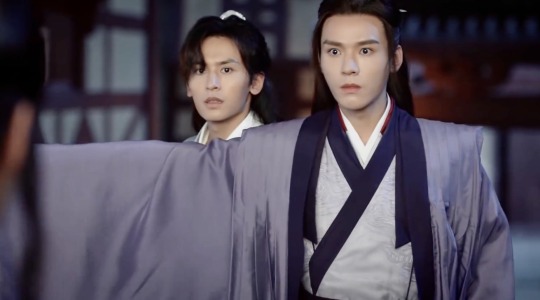
So No Kisses (TM) for the gays but the hets might do stuff I didn't pay attention to. All these from China. Some happy, most not.
The Untamed
Word of Honor
Guardian
SCI Mysteries
Stay With Me AKA Addicted 2.0 (I never watched this so there may be rough play)
Mr CEO Falling in Love With Me
The Fairy Fox
Youth in the Breeze
Precise Shot
Advance Bravely
His Cat AKA His Cat Boyfriend
The Male Queen: Han Zi Gao
The "Ghost Boyfriend" series
Past Youth
I Go To School Not By Bus (Hong Kong short)
Recommended Shorts with no kisses, but cute & fun
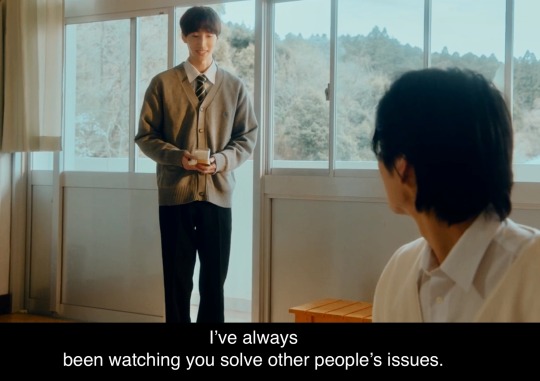
The 8.2 Second Rule (Japan YouTube)
One Last Order (Korea, Gaga)
Love Advisor (Thailand, YouTube)
BLs with Dead Fish Kisses (maybe? only one, if any)

His the series: I Didn't Think I Would Fall In Love (Japan ????) - (NOT His the movie) this one has all the angst you could want in your whole life. ALL OF IT. Japan wins at emo, it's their THING.
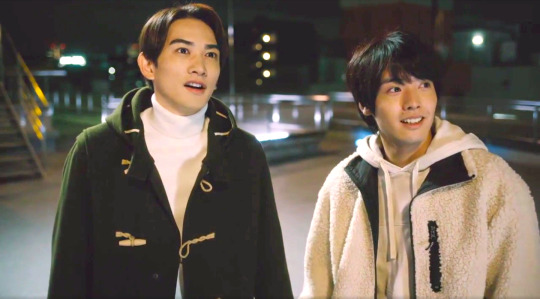
Cherry Magic AKA 30 Years of Virginity Can Make You a Wizard AKA 30-sai made Dotei Da to Mahotsukai ni Nareru rashii AKA Cheri Maho (Japan ????) - there's sort of some bed tussling and implied sex but you could imagine them just being snuggles for the mains, the sides have dead fish kiss. In general there's some angst but not much. It's fluffy and great. HIGHLY RECOMMENDED
Bonus: overt ace representation for one of the side characters.
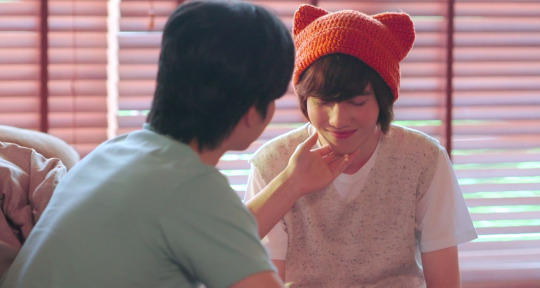
Meow Ears Up (Thailand Viki) - sides may kiss? I enjoyed this pulp especially at the start, the premise is fun. I think my biggest complaint was lack of kissing.
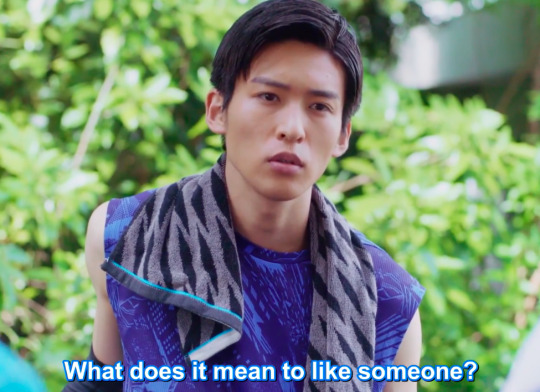
My Love Mix Up AKA Kieta Hatsukoi (Japan Viki), a case could be made for a demi seme in this BL. So much frenetic angst around bisexual identity crisis. HIGHLY RECOMMENDED

My Ride (Thailand Gaga) - my favorite Thai BL pulp the sides have a good kiss and the mains do kiss but it's v dead fish, not at all sexual, and it comes at the very end. Otherwise extremely chaste, I HIGHLY RECOMMEND this BL, queer and complex and engaging.

I Want to See Only You AKA Kimi no Koto Dake Mite Itai (Japan ????) - This is a beautiful piece of cinema well acted, about two boys who are opposite personalities and grew up together. The only kiss is the one pictured above, v dead fish. Full review here.
Nobleman Ryu's Wedding (Korea WeTV) - 12th Night goes BL in this cross dressing historical that ended up feeling like a Cinderfella fairy tale, lightly dramatic and utterly charming. Full review. There is one dead fishy kiss at the end but it's otherwise aggressively pure.
If you like this last style of KBL (with a kiss at the end being okay, I have quite a few more to recommend). Until 2022, most KBLs only had one dead fish kiss in them, so you are pretty safe with pre 2022 KBLs. They tend to be quite chaste and de-sexualized. Other good examples: Wish You, Light on Me.
That's all folx.
Some of the above I may be misremembering (since I don't rewatch this kind of BL and my memory is shit). And I may have forgotten some too, so I hope comments with jump in.
Others to consider:
(source)
#BLs for ace watchers#Ace BL kinda#bl recommendation#21 Days Theory#Thai BL#underappreciated BL#By me especially#My Esports Genius Brother#CHinese BL#censored bromance#HIStory My Hero#Taiwanese BL#Hidamari ga Kikoeru#Japanese BL#Silhouette of Your Voice AKA#Love of Siam#Fujimi Orchestra#Korean BL#Spring of Crush#Cherry Magic#meow ears up#Kieta Hatsukoi#My Ride the series#Kimi no Koto Dake Mite Itai#Nobleman Ryu's Wedding
161 notes
·
View notes
Text














The Love of Siam [2007]
#the love of siam#love of siam#rak haeng sayam#thai film#lgbt film#rosygifs#rosygifsthaibl#well another one off my list#I'm gonna need some time to recover
42 notes
·
View notes
Text
I haven’t posted anything about gmmtv2025….. Ticket to heaven ate and I have been watching it at least once a day…
Me and thee is just right up in pond’s ally… we love to see it… Marcpoon in a dog and a plane… we love improved chemistry over time… too many good shows to look forward to and a couple of mediocre jobs here and there to satisfy every fandom out there…. It is much better for gmmtv anyway… I won (tth) but the fact that I have to wait till late 2025 or early 2026 kills me but I wouldn’t have it any other way… any rushed productions is not worth it…. Genuinely curious who will win the lead roles of love of Siam (considering there are very few people who can sing and act at the same time (gem4th would be nice but we are happy with tth alone)
10 notes
·
View notes
Text
gmmtv is making Love of Siam Musical. hm.
5 notes
·
View notes
Text

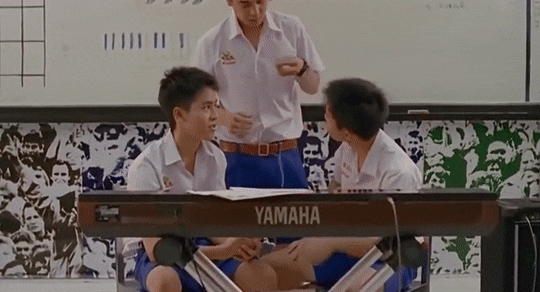
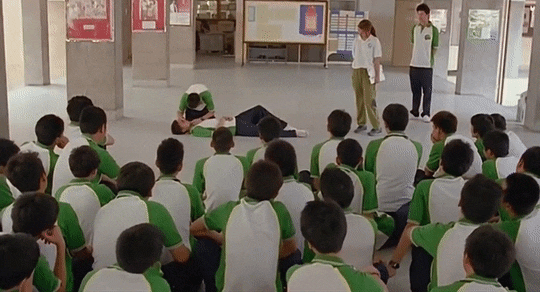
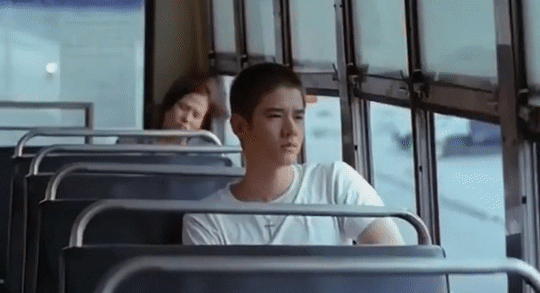
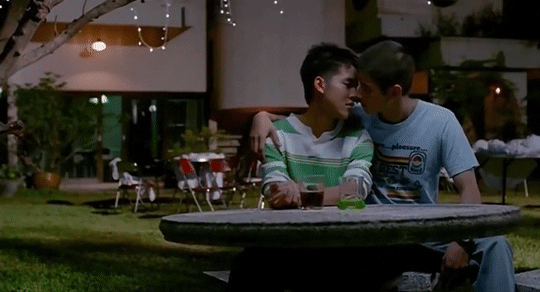
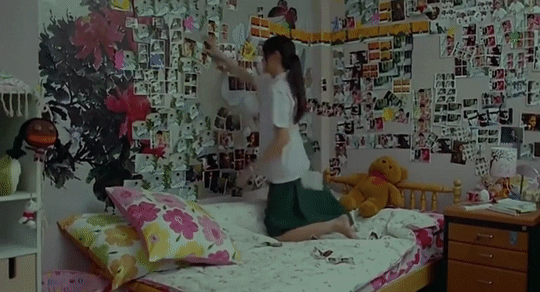
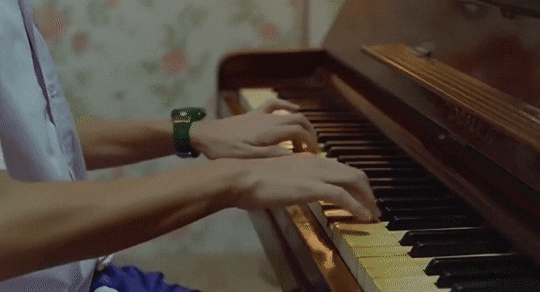


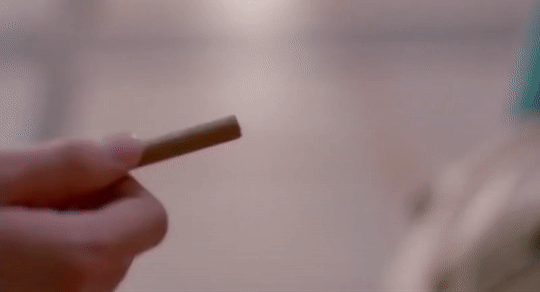
รักแห่งสยาม | LOVE OF SIAM (2007) dir. Chookiat Sakveerakul Boyhood friends Mew and Tong are separated due to an unexpected tragedy. Several years later, as teenagers, they meet again by chance on their senior year when Mew's boy band becomes a hit. As they become reacquainted, they discover unexpected feelings for each other. Meanwhile, Tong tries to patch his family back together, which had fallen apart after the mysterious disappearance of his sister, Tang, and the death of his grandmother. (link in title)
#lgbt cinema#gay cinema#Rak haeng Siam#love of siam#the love of siam#thai cinema#lgbt#gay#thailand#lgbt movie#gay movies#thai movie#lgbt film#gay film#thai film#lgbt media#gay media#queer cinema#asian cinema#southeast asian cinema#Chookiat Sakveerakul#Witwisit Hiranyawongkul#mario maurer#2007#00s#2000s#00s movies#00s film#2000s movies#2000s films
38 notes
·
View notes
Text
Turtles Catches Up With Old GMMTV: Love of Siam, The Intersectionality of Expectations and Demands, and the Tentacles of Influence On the BL Genre Edition
[What’s going on here? After joining Tumblr and discovering Thai BLs through KinnPorsche in 2022, I began watching GMMTV’s new offerings -- and realized that I had a lot of history to catch up on, to appreciate the more recent works that I was delving into. From tropes to BL frameworks, what we’re watching now hails from somewhere, and I’m learning about Thai BL's history through what I’m calling the Old GMMTV Challenge (OGMMTVC). Starting with recommendations from @absolutebl on their post regarding how GMMTV is correcting for its mistakes with its shows today, I’ve made an expansive list to get me through a condensed history of essential/classic/significant Thai BLs produced by GMMTV and many other BL studios. My watchlist, pasted below, lists what I’ve watched and what’s upcoming, along with the reviews I’ve written so far. Today, in a long post, I cover the pre-BL film Love of Siam, and its tremendous influence on today's Thai television BL genre.]
As we recover from the first weekend of Only Friends...now for something a little different, ha.
I mentioned a few weeks ago that while I was on the chronological journey through my Old GMMTV Challenge watchlist, that I jacked up my watch schedule to roll back in time to add two pre-television-BL movies in Love of Siam (2007) and My Bromance (2014). My review of My Bromance will drop later this week, but I want to give more attention at the moment to Love of Siam, a seminal film for queer media in Thailand, and a definite influence and harbinger on the development of the future genre of television BL in Thailand after the film's release. Considering our beloved Thai BL auteurs who have been knowingly influenced by LoS: it's a must-add for the list.
Now that I've watched Love of Siam: while I know I'm reviewing it in my 2023 watch schedule out of order, I am tremendously glad that this review will sit on top of the enduring list as the first of the Old GMMTV Challenge syllabus, as I think it contains a number of themes that get explored in the future of television Thai BLs from 2014 on. As well, the film also opens a door into how Thai, pan-Asian, and international audiences of various demographics receive and have received the film over the last 16 years since the film's release.
Most importantly for this piece: I'd like to address Love of Siam in an intersectional analysis, specifically analyzing the film from the queer lens/perspective and the Asian lens/perspective. What I'd like to address about LoS is as follows:
1) A summary of the movie, why Love of Siam was remarkable when it was released, and a quick overview of who has been influenced by it in Thai BL auteur circles, 2) How the ending of the movie (spoiler alert) has been received and understood by specific audiences, 3) An intersectional overview of those potentially differing expectations and opinions, and what that intersection means for how the global television BL fandom watches and understands Thai television BLs today, 4) What we see today, theme-wise, by what works and artists I think were influenced by Love of Siam,
and other floating points as I come to them.
It was the inimitable @bengiyo who recommended -- nay, insisted -- that I watch Love of Siam, not only for the OGMMTVC syllabus, but also as a means of analyzing I Told Sunset About You by way of its story structure and resolution, which I'll get into in a few moments. (I actually had the very great pleasure of joining @bengiyo and @shortpplfedup, along with a few other clowns, to talk about ITSAY on an upcoming The Conversation podcast, in which Love of Siam came up as a topic -- thank you, Ben and NiNi, for the honor! I'll talk more about the conversation that took place in the podcast in a few moments.)
Love of Siam focuses on Mew and Tong, two young schoolboys who were separated by a family tragedy in Tong's family. After Tong's sister disappears and is presumed dead, Tong's father turns to alcoholism, and the family moves away. Tong's mother takes up the mantle of breadwinner and the glue that keeps the rest of the family together. When Mew and Tong reach high-school age, they reconnect in Bangkok's Siam Square mall. I'll try to not give too much more away, because there's a tremendous follow-up to Tong's sister's legacy within the film, but the movie is perhaps best known for its ending, in which Mew and Tong do not get together. The two had spent the film negotiating their attraction to each other in the face of the intervention of Tong's mother, who worked on keeping them apart, and reconnected with the help of a mutual friend in Ying, who originally had a crush on Mew before discovering he was gay. The ending echoes the common endings of the majority of queer media at the time, in which couples did not get together, and/or were forcibly separated, and/or were tragically eliminated. (Brokeback Mountain was released two years earlier in 2005, and André Aciman's original novel, Call Me By Your Name, comes out in the same year as LoS, in 2007.)
For broad cinematic context, Love of Siam was Thailand's entry in the 2009 Academy Awards for Best Foreign Language Film (now called Best International Film). To compare LoS to television BLs on the OGMMTVC list, only the Nadao Bangkok works (I Told Sunset About You, etc.) come at all close to the quality of LoS's filming. The acting, the cinematography, the pacing, and the story structure of this movie were all superb. I enjoyed every minute of it, despite the ending. (We had our first instance of Kob Songsit playing a father named Korn, which -- was it a coincidence that he did the same in KinnPorsche? Especially considering KinnPorsche's happy ending -- it's a high likelihood. More on this in a bit.)
The movie received a fair share of controversy upon its release, as it had been originally marketed as a love story between two heterosexual teen couples. The "surprise," as it were, of finding out that Mew and Tong were the main romantic protagonists, caught Thai audiences by surprise. The filmmakers reported that they were unaware of the modern extent, at that point, of Thailand's common homophobia, but @bengiyo also let me know that at the same time, fans of the film were devastated to not see Mew and Tong get together in the end. Despite the competing controversies, the film was the most successful film in Thailand in 2007.
It's well known that many of our favorite Thai television BL auteurs, like Backaof Noppharnach, Jojo Tichakorn, New Siwaj, and others, watched and were influenced by the film -- they've talked about it previously in interviews in Soonvijarn and other arenas. I haven't seen My Only 12%, but @bengiyo tells me that New Siwaj directly tackles Love of Siam in that series. I'll come back to talk more specific works by these auteurs, and how I think some of these auteurs responded to the influence of Love of Siam in their works, in a bit.
As I mentioned previously: the ending of Love of Siam is controversial. Tong's mother intervened with Mew to tell him to stay away from Tong. She equates Tong being with Mew romantically to "losing her son" (a notion that is repeated in the 2019 film, Dew), which she clearly doesn't want after losing her daughter. Tong's mother is later shown as seeming to accept Tong's sexuality -- but it's not clear if she will ever accept him being in an actual relationship. That's not addressed. Separately, Mew's and Tong's friend, Ying, gives up on her romantic hopes towards Mew to help Tong reconnect with Mew after their brief separation.
Ying helps Tong find a meaningful token of his past with Mew. After gifting him the token, Tong says to Mew:
"I can't be your boyfriend. But it doesn't mean that I don't love you."
And Mew, smiling, says: "Thank you."
The end of the movie shows Ying sobbing heavily among her group of friends, and Mew sitting and crying in a room, saying "thank you" once more.
Jumping ahead a bit: during my participation in The Conversation podcast, the topic came up of whether or not ITSAY was an "apology" for Love of Siam. I think this question is a great way to enter what I briefly want to analyze intersectionally by way of how various audiences can interpret LoS's ending.
In conversation with the wonderful @bengiyo and @so-much-yet-to-learn (thank you both!), I understand that international queer audiences were severely disappointed in LoS's ending, for obvious reason. There was a lot in this movie that seemed to otherwise indicate acceptance of queer relationships and queer love, including by Tong's mother. That a relationship itself could not be confirmed was painful to watch.
When I was watching this film, I knew that the ending wasn't going to be good -- I just didn't know how it would play out exactly. I've had this experience before, where I'm aware that an ending of a thing I'm watching is going to be questionable, and when I get to the actual ending, I'm like -- OHHHH. Wait. I get why this ending is the way it is. The last time I felt like that was when I watched 2gether. In 2G, the ending/lack of intimacy immediately gave me a holistic understanding of why the show performed so well in Asia.
I watch Asian shows first and foremost with an Asian lens -- because I am an Asian. (I'm also a cishet woman.) My expectations of media coming from Asia are different than the expectations of non-Asian audiences. Maybe even as a cishet Asian woman -- my expectations of Asian media might be different from other Asian demographics, like Thai or pan-Asian queer audiences.
Generally speaking, the ending of LoS did not surprise me in the least, especially for being a piece from 2007. When Mew said "thank you," I was like, yep. Of course this was going to be how the movie ended.
Going back to the point I made earlier about queer media, globally, of this moment in 2007 having expected bad endings -- we come to an intersectional interpretive crossroads for Love of Siam's ending. Queer audiences were disappointed to be let down. I'm going to guess that the majority of Asian audiences, like myself, had a less surprised reaction (although again, to @bengiyo's point, it seems like some Thai fans protested the ending).
Non-happy, open-ended, and/or "bad" endings proliferate more in Asian media than in Western media. I've written about this before in a Big Meta on pain and suffering in Asian dramas. As an Asian consumer of Asian media, I've been conditioned all of life to not expect for the best of the characters I'm watching. Many of the Indian movies from the 1940s, '50s, and '60s that my parents showed me in my childhood had sad or politically-driven endings. Love being yanked right away for the sake of a "moral" or "ethical" lesson -- I'm conditioned to expect it. Most memorably for me, when I was a young lass, my parents showed me and my siblings Chemmeen, a 1965 film about a married woman nursing a long-lived lost-love with a man outside of her marriage. They had been separated all of their lives for various social status reasons. At the end of the film, when they finally embraced, they are wiped out by a storm. After the "WTF, mom and dad?!" outbursts from me and my siblings, my parents simply said -- this is the moral of a story that was important when we were growing up. You don't fall in love with someone you are not supposed to fall in love with. (Probably the saddest ending I've ever experienced in Asian media is Yoshimura Akira's Shipwrecks. I recommend it highly, but it's a bruiser.) (And MANY THANKS to my dear friend and fellow desi-homey, @neuroticbookworm, for tracking down Chemmeen based only on my hazy childhood memories!)
I've talked at length with @neuroticbookworm about our instinctual expectations of Asian media and when Asian media either toes the line of predictability (sad endings) or when it pushes the paradigm to, for us, new results (happy endings). (And this is in spite of Bollywood, which of course often has happy endings, but even Kuch Kuch Hota Hai, one of the biggest Indian movies of all time, was laced with sadness.)
LoS did something different than the media I grew up with, which I appreciated in the film. It was subtle, but as @bengiyo noted to me -- it was there. A whiff of acceptance was in the movie. This was the Thai film industry's way of beginning to play around with queer acceptance. I personally think that while the ending statements of "thank you" were stark, they did not indicate anything by way of emotional conclusion for Mew. When I saw Mew crying during his last "thank you," and Ying bawling at the end of the movie -- I took from that their acceptance of the devastation of a socially and culturally-based decision that needed to be made by Tong and his family.
Mew and Tong could acknowledge their love to each other. But for 2007 Thai cinema, they could not go further than that. To flirt with the idea that a Thai family would, in fiction, accept a gay relationship, was likely too progressive. Censors, the government, even Thai audiences, all may have balked.
The intersectional crossroads of this decision are important for me to root myself in. On the one hand, there's the disappointment of Thai, pan-Asian, and international queer audiences that Mew and Tong could not come together.
(I want to note that specifically for Western/non-Asian audiences of all demographics, there is a reality that a DEMAND that Asian filmmakers create happy endings — like Mew and Tong coming together — might be coming from a colonialist point of view, one that may ignore or not consider common Asian media practices and cultures. I unfortunately see this often in shipper culture emanating from the West, and I'm heartened that some Thai content makers are beginning to call international fans out on it. I note down below that market expectations of these endings have certainly changed in today's age, but checking privileges upon demanding something specific of Asian content is something that is always worth doing.)
On the other hand, there are Thai and pan-Asian audiences that interpret Mew and Tong not coming together as a matter of timing (the market not being ready for a confirmed queer relationship on screen), and as well, a matter of expectation that what we'd HOPE for -- Mew and Tong being together -- could AND would not happen, because conversationally, that kind of happiness would be culturally and socially impossible both in art and in real life. For instance, for Mew and Tong to negotiate their relationship with their respective families, on screen, in 2007? Talking to their parents about how they could get together? Damn. I can't.... for that time period, I cannot imagine Asian media, Thai or otherwise, going there. To involve families talking about acceptance -- I don't believe the market, Asian-based audiences, and even international Asian-diaspora audiences being ready for that. (And that's not to say that people of my generation wouldn't have welcomed it. But, for instance -- my parents' generation would have been in protest for movies depicting that kind of conflict, resolution, and outcome playing out in any sort of positive way.)
Remember, again, this is 2007. Let's jump WAY ahead for a second -- to the now, when we can have a show like My School President in 2022. A show, like LoS, that depicts two high school boys navigating attraction and love. A show that actually features a high school band (Mew being a lead singer in a band is a main plot point of LoS). And a show that includes young men falling in love and navigating their families. And Gun and Tinn end up together.
How far we've come from 2007 to now. As I noted above, the expectations of audiences outside of queer circles among Asian and international audiences for positive endings have changed drastically. I haven't even watched MSP yet, but imagine if Gun and Tinn DIDN'T get together. Think about it for a moment. Even as someone who hasn't watched the show yet -- even I know how crazy that sounds, from what we've been habituated to expect out of Thai television BLs, since the rise of the genre from Love Sick in 2014 -- a full seven years after the release of LoS. Thai, pan-Asian, and international audiences of all demographics would have been up in arms.
We know now -- again, seven years after the release of LoS -- how seminal Love Sick was for Thai television BLs, in including the Phun x Noh storyline in the context of an ensemble drama. And now, I feel like I have even more context for how UTTERLY seminal the ending of Love Sick was -- for Phun and Noh to consciously decide to BE TOGETHER, and to end the show that way, in the face of the line of previous expectations that LoS had originally had to toe. It fills my heart that so much progress could have been made in such a short time. Seven years doesn't seem short. But this is where I often drop a comparative point -- that it took 50 years for gay marriage to be legalized in America. Change sometimes seems long, but in hindsight -- change can also happen fast in context.
I think the intersectional conclusion to this is that Thai filmmakers didn’t give up in pushing to experiment with positive endings in a genre — queer media — that didn’t commonly have them. By having Phun and Noh confirm their relationship in Love Sick; by having TeeFuse and FrameBook CELEBRATE their relationships in the early BL series, Make It Right/MIR 2 — these shows began to change an expectedly doomed paradigm of sadness and heartbreak. And — AMAZINGLY! — these early shows that took such risks found accepting audiences. And the market has since responded.
Now — with these shows also came the rise of toxic shipper culture and continued homophobia of actors who are actually out and gay. That’s the gray side to all of this. But Thai BL auteurs then and now still play in this sandbox. As akin to the legislation of gay marriage in America, the progress of LGBTQ+ acceptance in Thai media and Thai society is rocky. (Remember this: Barack Obama did not outright support gay marriage when he first ran for office. He was already president when he permanently changed his public tune.) But that road is continually being paved as audiences in Thailand and globally grow ever more accepting of equal rights for all. While queer audiences celebrate this with bells on — I also am beyond thrilled that Asian audiences can take away learnings about LGBTQ+ equality, especially in countries where homosexuality is banned (Malaysia), where same-sex marriage is legal (Taiwan), and in everywhere in between, where there may be outward social practices of acceptance and internal practices of continued familial or even social homophobia. The general consistency of moving the dial forward on Thai BL media showing equality is good for ALL audiences, no matter how you cut it.
I want to take a moment to talk about the clear and enduring influence that LoS had had on present-day Thai BLs. Like I said earlier, many of our favorite Thai BL auteurs have stated that they were influenced by LoS, and I want to just do a little nerdy comparative analysis out of admiration for those creators that I simp on.
As I wrote previously, I thought LoS was brilliantly written and filmed -- it was a gorgeous movie, even at a 2.5-hour run time. LoS was rooted in a few major themes (but there are more within the film) that I see cropping up in present-day Thai BLs.
The first is the use of religion and spirituality as a means of indicating cultural mores around queer acceptance. Tong's family is Catholic. Catholic imagery peppers the film -- most notably for me, towards the end of the movie, when Tong flops on his bed with a huge poster of the cross pasted on the wall above him. Like I wrote earlier, Tong's mother has said to Mew -- if you two get together, I will lose my son. Tong being in a queer relationship is clearly against the family's Catholic practices -- the cross hovers in Tong's most intimate space.
On the flip side, Mew's family is Buddhist, and clearly demonstrated as so. I would also argue that Tong's Catholic family benefits from Buddhist beliefs, in a reincarnation plot that includes Tong's sister. As we know from the many Thai BLs that incorporate depictions of Buddhist practices -- Buddhism does not generally speak to a condemnation of the LGBTQ+ community, although local expressions and practices may differ. He's Coming To Me, Until We Meet Again, and Big Dragon are three shows that, to me, include Buddhist frameworks most distinctly, but of course -- our beloved BL guys are going to temples all the time and making merit. Even Gay OK Bangkok has multiple temple scenes -- and that's an overtly queer, non-BL drama. A temple is often a common locale that we see our beloved queer couples able to be together safely, outside the privacy of a home.
The second theme of note emanating out of LoS is filial piety. When Tong says to Mew, "I can't be your boyfriend," part of what he's saying is -- I can't do this to my family. Filial piety is SUCH a presence in many BLs -- to me, most notably in I Told Sunset About You, as I reflect on Teh's hugely emotional reaction in giving up his university admission for Oh-aew, and the fall-out vis à vis his mother that results from that decision (and Oh-aew has his own filial piety storyline as well). (I want to note that the ITSAY links include a phenomenal reblog from @bengiyo that talks in part about how ITSAY speaks to LoS -- a must-read.) Part of the presumed danger of coming out in Thai BLs, to me, stems from not only fearing rejection of one's own sexuality by a character's family -- but in also disappointing one's family in the public and private Asian family construct, especially considering that we're witnessing mostly young men coming out, who carry their own load of gender-based expectations from their families.
This harkens back for me Thun's coming-out conversation with his mother in episode six of He's Coming To Me. In episode five, Thun asks, famously, on a rainy rooftop -- "I have this feeling, but I don't know what to call it" (which, I think, is an Aof callback to Tong asking Ying in LoS -- "what am I, Ying?"). In episode six, Thun, a young man who has already lost his father, clearly sits with concern that he might lose his mother. And, of course, Thun's mother comes back with the most empathetic response to a coming-out that I've ever seen in a Thai BL. Maybe Thun's mom is also a response to Tong's mom.
Finally, I want to go back to the theme and the idea of sad endings vs. happy endings. When I first began to get OBSESSED with Thai BLs was when I watched Bad Buddy for the first time. Bad Buddy, to me, encapsulated a feeling I had that what I was watching was DISTINCTLY, PROGRESSIVELY Asian by the many themes it included that I relate to as an Asian, from filial piety, to intergenerational trauma, to keeping secrets from family and friends, and so much more.
I think, for my interpretative stance at this point of the OGMMTVC, that it's clear that Aof Noppharnach has most commonly addressed themes and influences from LoS in his work (again acknowledging that New Siwaj did something similar in My Only 12%). I think I admire the endings of He's Coming To Me and Bad Buddy in particular because Aof did something that I think is really hard to pull off. As I said to @so-much-yet-to-learn, Aof pulled off not-necessarily-happy, open-ended resolutions to those two shows that hewed far more to real-life-level conclusions about queerness than overtly happy endings in the face of other tenuous influences, such as family rejections. At the end of He's Coming To Me, Thun is in love with a ghost that may be reborn at any point in time — Thun could lose Med without a moment’s notice. At the end of Bad Buddy, Pran and Pat are not out to their families and are separated by distance. But -- à la Love of Siam -- there are subtle indications that acceptance may be on the horizon on the part of Pran's and Pat's families.
To me, Aof negotiating these endings is just so brilliant, and hews authentically to the journey, to the path that Asian audiences, like myself, can once again relate to from the media we grew up with. If we as Asians grew up not expecting happy endings, how does that change our experience of watching shows that end happily now? By watching media with inconclusive or pointedly unhappy endings, Asian audiences are led to think that life is more complicated and gray than a happy ending would lead one to believe. From a queer lens — if the MAJORITY of queer media ends badly, then it seems that the underlying message is that the community ITSELF doesn’t DESERVE happiness. I will always appreciate the majority of Thai BLs changing this paradigm.
Many of Aof’s work sit in the middle of this, either by ending or by journey. Moonlight Chicken indicates a painful growth and acceptance process of internalized homophobia for Jim, the chicken rice vendor. Same for Phupha, from A Tale of Thousand Stars to Our Skyy 2. Pat and Pran are physically separated and mostly closeted. Thun is dating a ghost. Even Type and Man in Still 2gether are almost permanently separated by Type’s job. Aof doesn’t shy away from loose ends. He’s not giving devastation. He’s balancing, I think, the history of what was expected, with what real life often gives by way of what actually happens in imperfect situations.
And this isn’t entirely universal in Aof's works. In the two previously existent series that Aof "took over" in Kiss Me Again and 2gether: Pete and Kao are solid at the end of Dark Blue Kiss. Sarawat and Tine end nice and heaty in Still 2gether. But what I think is particularly brilliant about Aof’s overall oeuvre is that balance and appreciation he clearly has for art that questionable, open-ended endings gave to pieces back when he and I were younger folks. Aof doesn’t devastate us, or his characters. But he certainly makes all of us — his characters and his audiences — contemplate the meaning of our existences and our roles in society by way of the obstacles and inequities we all face, by the time a show of his is concluded. Those searing examinations are what I live for in his repertoire in particular, and they are what remind me the most about the Asian media I grew up with vis à vis Aof’s modern works.
I have to thank him for that. Maybe as an older viewer of Thai BLs (I'm close in age to Aof), I sometimes need a bridge to the robust happy endings that shows like Make It Right, Dark Blue Kiss, Still 2gether, and more have. Love of Siam reminded me of where we once stood. Aof's works are the bridge to a kind of 180-degree turn-of-perspective, towards a happiness in fiction that, as a child of Asian media, I never knew I could enjoy. And I'm glad, in today's age as I continue to robustly enjoy the genre that is Thai BL, that I can experience that kind of satisfaction in Thai art now.
[So all of this is happening while we're getting early into Only Friends, and Dangerous Romance premieres this week. The riches! So much going on!
Later this week, I'll publish a (hopefully short-ish) review of another film, My Bromance (2014) to talk about the Flukes and yaoi influences on BL. Then, FINALLY (!!!) will come my Manner of Death review, my A Tale of Thousand Stars rewatch review, my Lovely Writer review (LOVED THIS SHOW), and somewhere in-between, a non-OGMMTVC review of Jojo Tichakorn's The Warp Effect, which I'm HOUSING for the sake of Only Friends.
Hit list below! Hit me with feedback! (Tumblr's new web editor is jacking with this list below and not letting me strikethrough those shows that I've watched. For the most updated list, check this link right here.)
1) The Love of Siam (2007) (movie) 2) My Bromance (2014) (movie) (review coming) 3) Love Sick and Love Sick 2 (2014 and 2015) (review here) 4) Gay OK Bangkok Season 1 (2016) (a non-BL queer series directed by Jojo Tichakorn and written by Aof Noppharnach) (review here) 5) Make It Right (2016) (review here) 6) SOTUS (2016-2017) (review here) 7) Gay OK Bangkok Season 2 (2017) (a non-BL queer series directed by Jojo Tichakorn and written by Aof Noppharnach) (review here) 8) Make It Right 2 (2017) (review here) 9) Together With Me (2017) (review here) 10) SOTUS S/Our Skyy x SOTUS (2017-2018) (review here) 11) Love By Chance (2018) (review here) 12) Kiss Me Again: PeteKao cuts (2018) (no review) 13) He’s Coming To Me (2019) (review here) 14) Dark Blue Kiss (2019) and Our Skyy x Kiss Me Again (2018) (review here) 15) TharnType (2019-2020) (review here) 16) Senior Secret Love: Puppy Honey (OffGun BL cuts) (2016 and 2017) (no review) 17) Theory of Love (2019) (review here) 18) 3 Will Be Free (2019) (a non-BL and an important harbinger of things to come in 2019 and beyond re: Jojo Tichakorn pushing queer content in non-BLs) (review here) 19) Dew the Movie (2019) (review here) 20) Until We Meet Again (2019-2020) (review here) 21) 2gether (2020) and Still 2gether (2020) (review here) 22) I Told Sunset About You (2020) (review here) 23) YYY (2020, out of chronological order) (review here) 24) Manner of Death (2020-2021) (not a true BL, but a MaxTul queer/gay romance set within a genre-based show that likely influenced Not Me and KinnPorsche) (review coming) 25) A Tale of Thousand Stars (2021) (review here) 26) A Tale of Thousand Stars (2021) OGMMTVC Fastest Rewatch Known To Humankind For The Sake Of Rewatching Our Skyy 2 x BBS x ATOTS (review coming) 27) Lovely Writer (2021) (review coming) 28) Last Twilight in Phuket (2021) (the mini-special before IPYTM) 29) I Promised You the Moon (2021) 30) Not Me (2021-2022) 31) Bad Buddy (2021-2022) (thesis here) 32) 55:15 Never Too Late (2021-2022) (not a BL, but a GMMTV drama that features a macro BL storyline about shipper culture and the BL industry) 33) Bad Buddy (2021-2022) and Our Skyy 2 x BBS x ATOTS (2023) OGMMTVC Rewatch 34) Secret Crush On You (2022) [watching for Cheewin’s trajectory of studying queer joy from Make It Right (high school), to SCOY (college), to Bed Friend (working adults)] 35) KinnPorsche (2022) (tag here) 36) KinnPorsche (2022) OGMMTVC Fastest Rewatch Known To Humankind For The Sake of Re-Analyzing the KP Cultural Zeitgeist 37) The Eclipse (2022) (tag here) 38) GAP (2022-2023) (Thailand’s first GL) 39) My School President (2022-2023) and Our Skyy 2 x My School President (2023) 40) Moonlight Chicken (2023) (tag here) 41) Bed Friend (2023) (tag here) (Cheewin’s latest show, depicting a queer joy journey among working adults) 42) Be My Favorite (2023) (tag here) (I’m including this for BMF’s sophisticated commentary on Krist’s career past as a BL icon) 43) Only Friends (2023)]
#love of siam#the love of siam#love of siam meta#the love of siam meta#backaof noppharnach#new siwaj#bad buddy#he's coming to me#dark blue kiss#still 2gether#my school president#turtles catches up with old gmmtv#the old gmmtv challenge#ogmmtvc#turtles catches up with the essential bls#turtles catches up with thai bls
36 notes
·
View notes
Note
Hello hello~~
I hope you're having a wonderful day~
I was reading your reblog of @waitmyturtles ITSAY review and a question came to mind.
Love of Siam was one of my first contacts with Thai media, and to this day I think of as special. One interesting thing I saw once, was how the Soonvijarn crew (p'Aof and friends, for those who don't know) talked about it. Idk if you've seen that video but if you haven't I highly recommend it.
They talk about how Love of Siam had been marketed as a coming of age straight love story, iirc. And how the public reacted to the "surprise they're gay", and how some had used that movie as a stepping stone to come out to their parents.
I feel there's a lot to be said about how Love of Siam, by itself (regardless of the plot (of which there's a lot to be said) and just taking the presentation of its characters), impacted Thai society and Thai Queer Cinema (and by extension BL) in the way it talks about or shows queer people.
But I am no film major, nor do I know enough about the reception of Love of Siam to articulate this. So I guess my question would be what are your thoughts on that?
I hope this makes sense cause maybe it doesn't, but in any case I just am dying to talk about this movie xD
I think it's hard from outside of Thailand to see exactly where these things go. At least from within America, I remain frustrated about what is genuinely possible from movies. I thought Moonlight (2016) would be a huge moment that led to a new wave of queer media, and it just doesn't exactly feel like we've felt that wave.
As for Thailand, I don't know what other factors were moving before Love of Siam frustrated a generation of audiences with its ending, but the fact that we've had well over 300 Thai BL productions since 2014 says a lot about where the culture was headed.
I think I will always have complicated feelings about this film, and I'm glad that the ending of ITSAY helped me put some of those feelings away.
17 notes
·
View notes
Text
Love of Siam as a musical? My two least favourite things in BL (sad endings and singing) in one terrifying package. What is GMMtv on?
@absolutebl - I suspect this be on your 'wtf are they thinking??' list as well
6 notes
·
View notes
Text
About to start watching Love of Siam. I've read enough descriptions of it that I'm going to watch without subtitles and hope for the best, so I don't think this is going to become a liveblog, also because I'm watching on my new TV so can't screenshot. But you never know.
6 notes
·
View notes
Text

hey guys
#animals#kittens#pets#ratblr#kitty#baby animals#petblr#puppies#dogs#reptiblr#black cats#siameseworld#seal point siamese#love of siam#snowshoe siamese#applehead siamese
8 notes
·
View notes
Text





The Love of Siam [2007]
#the love of siam#love of siam#rak haeng sayam#thai film#lgbt film#rosygifs#rosygifsthaibl#I made way too many gifs of this film#gonna be posting some more random sets
21 notes
·
View notes
Text
some of you haven't sat down and watched love of siam (2007) and it shows. who Else is up thinking abt the "This is my loneliness" scene and crying . Who else has also replayed it 15 times. this movie never fails to strike me in the heart as it did 10 years ago.
3 notes
·
View notes
Text
'Yong Love of Siam gagawing musical daw? (as if naman maiintindihan ko Thai songs no hahaha)
0 notes
Text
I am reminded of the time that these two showed up at Bangkok pride...

Look at the t-shirt! Fantastic. Winning callbacks. No notes.


Kim and Pie, the couple of Thailand’s first lesbian film ‘Yes or No’ (2010), making a cameo in The Secret of Us (2024) was not on my bingo card. HOLY SHITTTT
950 notes
·
View notes
Text


Now they are a trio. Let’s continue that beautiful chaos @mellosdrawings ~
#twisted wonderland#vil schoenheit#rook hunt#twst oc#the Pomefiore Siameses#Akanka Siam#Akedya Siam#Hayeli#The lovely menaces <3#I’m sorry Vil but we love you very much
1K notes
·
View notes